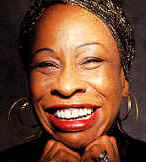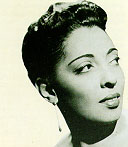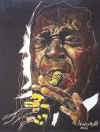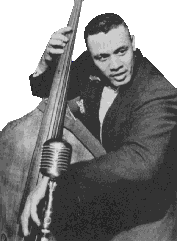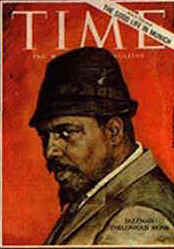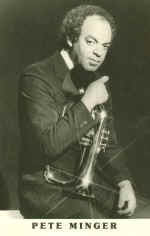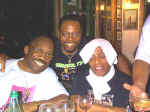#37
DEFINITIONS OF BEBOP
Bebop. It involved unusual repetition of phrases and an offbeat, angular pattern of sound.
This is the definition given by someone in an email.
What do you think? Your reply is important.
Thanks
Joan
![]()
Playing "bop" is like playing Scrabble with all the vowels missing.
Duke Ellington
![]()
Blues is to jazz what yeast is to bread-without it, it's flat.
Carmen McCrae
![]()
Bebop- Improvisation at its best. Established its own creative space thus initiating controversy. Keep it real our music.
Jay Edwards - WCLK 91.9 FM
![]()
Bebop
is a conglomeration of melody, harmony and rhythm. Sometimes arranged
melodically, harmonically and sometimes polyphonically, sometimes contré.
Expressing a theme after which time improvisation extends itself on top
and in between the harmonies.
Initially thought to be un-danceable. Not true, if you can
dance......
Sandy Patton (vocalist)
![]()
Also
include classical influence of chord changes based on Bach as well as
rhythms based on Black rhythmic patterns repeated on wood drums and
gourds. That's what I think.
Artie Simmons (drums, trombone, composition)
![]()
I
think it is very simplistic at best. Read my definitions
of bebop, vocalese, hiphop and their relationship to each other.
Go
to my site www.hipbopvocalese.com
and see what I said about bebop in the FAQ section. Nelson
Harrison (trumpet/composition)
If someone
has been escaping reality, I don't expect him to dig my music.
Charles
Mingus
![]()
Thelonious
Monk Poem: "Thelonious
Monk," by Stephen
Dobyns, from Common Carnage (Penguin).
A record store on Wabash was where
I bought my first album. I was a freshman
in college and played the record in my room
over and over. I was caught by how he took
the musical phrase and seemed to find a new
way out, the next note was never the note
you thought would turn up and yet seemed
correct. Surprise in 'Round Midnight
or Sweet and Lovely. I bought the album
for Mulligan but stayed for Monk. I was
eighteen and between my present and future
was a wall so big that not even sunlight
crossed over. I felt surrounded by all
I couldn't do, as if my hopes to write,
to love, to have children, even to exist
with slight contentment were like ghosts
with the faces found on Japanese masks:
sheer mockery! I would sit on the carpet
and listen to Monk twist the scale into kinks
and curlicues. The gooseneck lamp on my desk
had a blue bulb which I thought artistic and
tinted the stacks of unread books: if Thomas
Mann depressed me, Freud depressed me more.
It seemed that Monk played with sticks attached
to his fingertips as he careened through the tune,
counting unlike any metronome. He was exotic,
his playing was hypnotic. I wish I could say
that hearing him, I grabbed my pack and soldiered
forward. Not quite. It was the surprise I liked,
the discordance and fretful change of beat,
as in Straight No Chaser , where he hammers together
a papier-mâché skyscraper, then pops seagulls
with golf balls. Racket, racket, but all of it
music. What Monk banged out was the conviction
of innumerable directions. Years later
I felt he'd been blueprint, map and education:
no streets, we bushwhacked through the underbrush;
not timid, why open your mouth if not to shout?
not scared, the only road lay straight in front;
not polite, the notes themselves were sneak attacks;
not quiet-look, can't you see the sky will soon
collapse and we must keep dancing till it cracks?
for Michael Thomas
